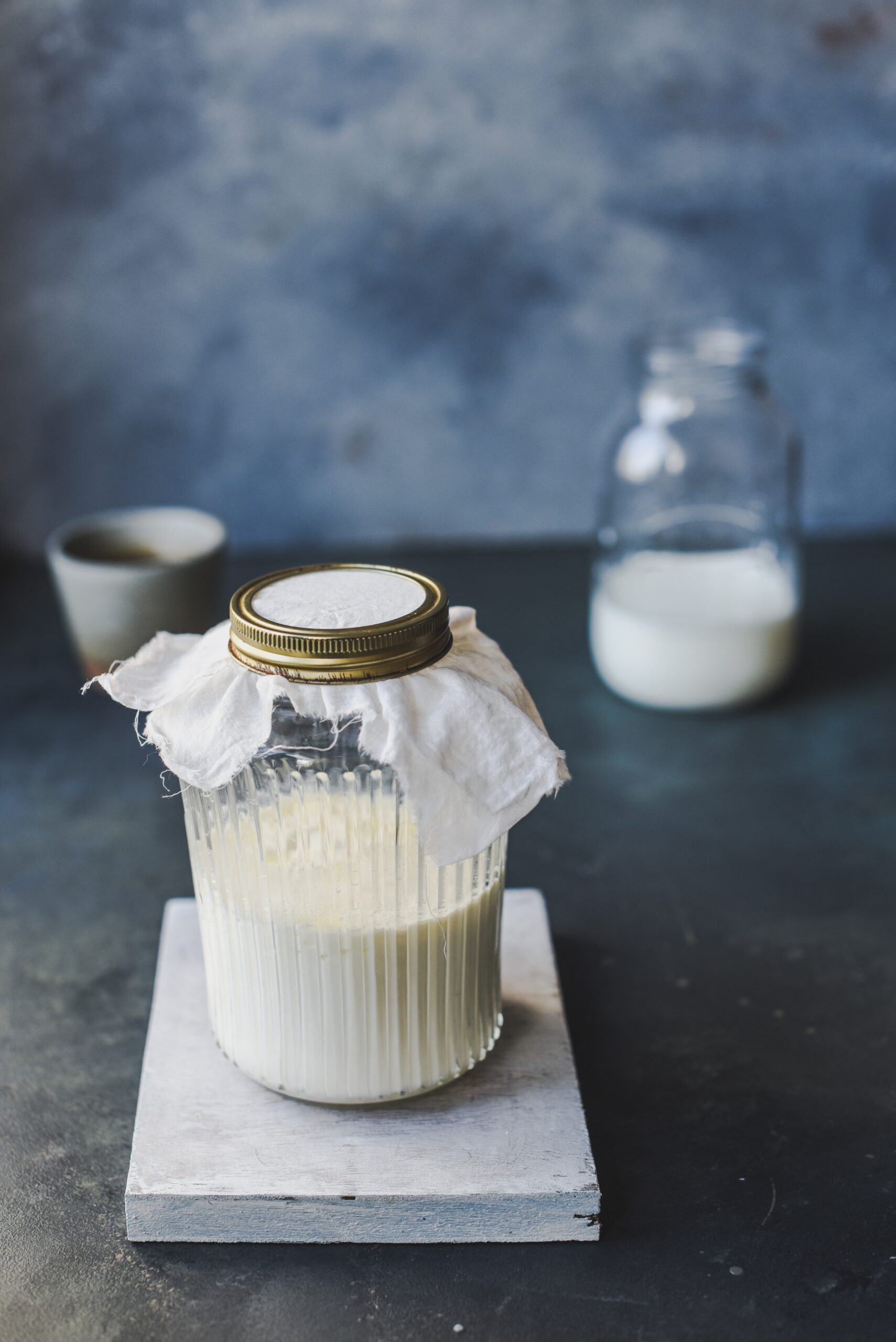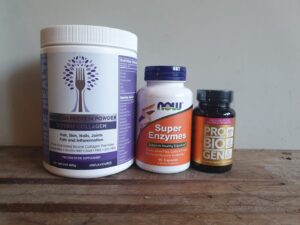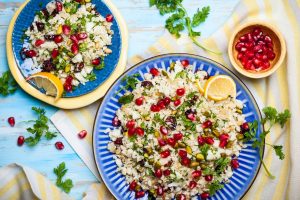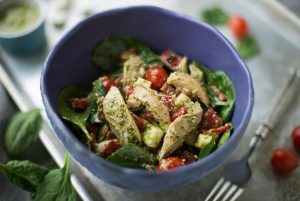KEFIR – A FERMENTED “SUPERFOOD”
I would personally class kefir as a superfood, and here’s why: the various types of beneficial microbiota contained in kefir make it one of the most potent probiotic foods available.
It contains many different strains of not just beneficial bacteria, but beneficial yeasts as well. Kefir contains several major strains of bacteria not commonly found in yogurt. The naturally occurring bacteria and yeast combine symbiotically to give superior health benefits.
We don’t fully understand the gut microbiome, but more and more research is showing how vital the bacteria that live in our digestive system are to our health. For fascinating reading on the gut micro biome, check out the Human Food Project.
Kefir is an excellent source of essential amino acids. The complete proteins in kefir are partially digested and therefore more easily utilised by the body. It is a good source of the amino acid tryptophan.
Melatonin and serotonin, both synthesized by the body from the amino acid tryptophan, together regulate peristalsis of the digestive tract and have a relaxing effect on the nervous system.
Kefir is a rich source of vitamins and minerals, particularly those important for bone health such as calcium, magnesium and phosphorus. Since it is a product of bacterial fermentation, it is also very likely a good source of the elusive vitamin K2, which is also crucial for bone health, particularly if the milk comes from grass-fed cows. It is also a good source of B vitamins, particularly B12.
Even people with lactose-intolerance can usually tolerate kefir since the beneficial bacteria and yeasts consume most of the lactose originally present in the milk.
The curd size of kefir is smaller than yogurt, making it easier to digest so it is a particularly excellent and nutritious food for babies, the elderly and some people with digestive disorders.
Research has demonstrated that kefir has anti-microbial properties (against bacteria such as E-coli and Salmonella) as well as anti-inflammatory properties.
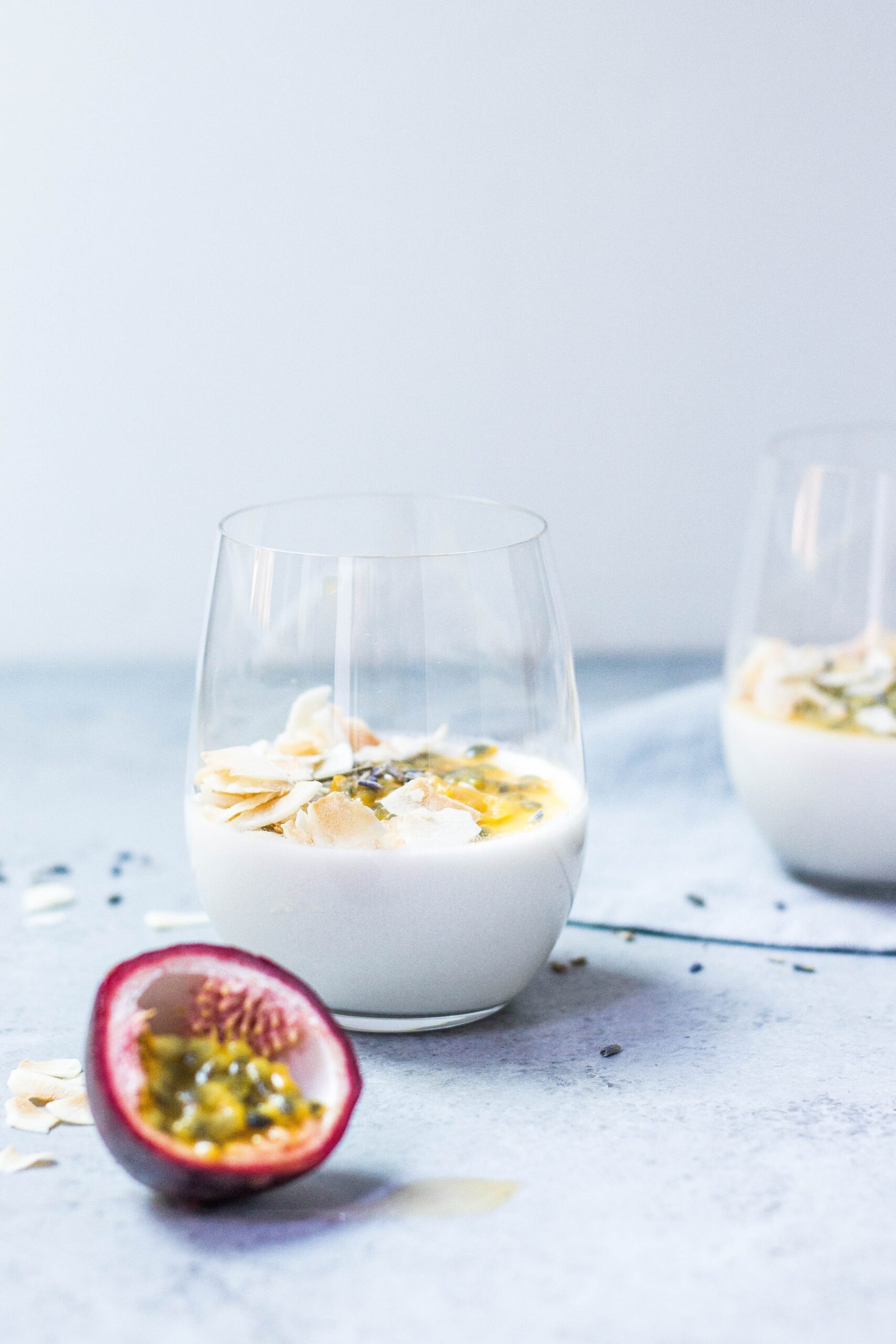
Some studies have also shown an anti-tumour effect. In one study, kefir consumption inhibited tumour growth and induced the apoptotic form of tumor cell lysis, suggesting that kefir may play a role in cancer prevention.
This paper reviews the literature on kefir: Microbiological, technological and therapeutic properties of kefir: a natural probiotic beverage.
Read Chris Kresser’s article on kefir here.
Where can you buy kefir in the UK?
I get raw (unpasteurised) kefir from Plawhatch Farm on the edge of the Ashdown Forest, near Sharpthorne. The farm is a community-run, organic, biodynamic farm and the cows are grass-fed. For anyone local – you can visit their website to find out more.
Chuckling Goat sell raw goat’s milk kefir and coconut water kefir, available to buy online.
Rhythm Health produce raw coconut milk kefir, available to buy in Wholefoods and certain branches of Holland and Barratt: http://www.rhythmhealth.co.uk
How to Use Kefir
You can drink kefir as it is, if you like the taste. I add it to smoothies, where it adds a creamy taste and texture. Check out the recipe for my Ultimate Gut Health Smoothie here.

Nutrition in Kefir
It is a rich source of vitamins and minerals and an easily digested and bioavailable source of protein. It is also a fantastic source of beneficial bacteria and yeasts making it a great probiotic.
Probiotics in Kefir
Considering the price of most decent probiotics on the market, and comparing the list of strains found in common probiotics compared to the long list of microbes commonly found in kefir, you can see that kefir is cheap in comparison and probably superior too. So if you can’t afford probiotic supplements then you should definitely consider adding kefir to your daily diet.
BACTERIAL STRAINS COMMON TO MILK KEFIR GRAINS
- Lactobacillus acidophilus
- Lactobacillus brevis
- Lactobacillus casei
- Lactobacillus delbrueckii subsp. bulgaricus
- Lactobacillus delbrueckii subsp. delbrueckii
- Lactobacillus delbrueckii subsp. lactis
- Lactobacillus helveticus
- Lactobacillus kefiranofaciens subsp. kefiranofaciens
- Lactobacillus kefiri
- Lactobacillus paracasei subsp. paracasei
- Lactobacillus plantarum
- Lactobacillus rhamnosus
- Lactobacillus sake
- Lactococcus lactis subsp. cremoris
- Lactococcus lactis subsp. lactis
- Lactococcus lactis
- Leuconostoc mesenteroides subsp. cremoris
- Leuconostoc mesenteroides subsp. dextranicum
- Leuconostoc mesenteroides subsp. mesenteroides
- Pseudomonas
- Pseudomonas fluorescens
- Pseudomonas putida
- Streptococcus thermophilus
YEAST STRAINS COMMON TO MILK KEFIR GRAINS
- Candida humilis
- Kazachstania unispora
- Kazachstania exigua
- Kluyveromyces siamensis
- Kluyveromyces lactis
- Kluyveromyces marxianus
- Saccharomyces cerevisiae
- Saccharomyces martiniae
- Saccharomyces unisporus
References
Microbiological study of lactic acid bacteria in kefir grains by culture-dependent and culture-independent methods
Analysis of the microflora in Tibetan kefir grains using denaturing gradient gel electrophoresis
NUTRITIONAL COMPOSITION
Typical of milk, several dietary minerals are found in kefir, such as calcium, iron, phosphorus, magnesium, potassium, sodium, copper, molybdenum, manganese, and zinc. Also similar to milk,[13] kefir contains vitamins in variable amounts, including vitamin A, vitamin B1 (thiamine), vitamin B2 (riboflavin), vitamin B3 (niacin), vitamin B6 (pyridoxine), vitamin B9 (folic acid), vitamin B12 (cyanocobalamin), vitamin C, vitamin D, and vitamin E.[15] Essential amino acids found in kefir include methionine, cysteine, tryptophan, phenylalanine, tyrosine, leucine, isoleucine, threonine, lysine, and valine,[15] as for any milk product.[13]
PROBIOTICS
Probiotic bacteria found in kefir products include Lactobacillus acidophilus, Bifidobacterium bifidum, Streptococcus thermophilus, Lactobacillus delbrueckii subsp. bulgaricus, Lactobacillus helveticus, Lactobacillus kefiranofaciens, Lactococcus lactis, and Leuconostoc species.[3][12][16] The significance of probiotic content to nutrition or health remains unproven.[17][18]
Lactobacilli in kefir may exist in concentrations varying from approximately 1 million to 1 billion colony-forming units per milliliter and are the bacteria responsible for the synthesis of the polysaccharide kefiran.[4]
In addition to bacteria, kefir often contains strains of yeast that can metabolize lactose, such as Kluyveromyces marxianus, Kluyveromyces lactis and Saccharomyces fragilis, as well as strains of yeast that do not metabolize lactose, including Saccharomyces cerevisiae, Torulaspora delbrueckii, and Kazachstania unispora.[3] The nutritional significance of these strains is unknown.
About Me
Hello, I’m Chloe. I’m a nutrition and health coach and I’m on a mission to inspire & support women so they can go from feeling fatigued to feeling fabulous!

I help women who are FED up of being overweight, addicted to sugar and feeling tired ALL THE TIME to lose weight and optimise their health by fixing hormonal, digestive, autoimmune and energy issues.
My step-by-step programme, Revitalise, will help you lose weight, get back your energy, restore vitality and create lifelong health using the power of beautiful & delicious REAL FOOD.
I’m here to make it easy for you to eat healthy, delicious food without counting calories or feeling deprived. You’ll reset your relationship with food, shift your mindset and build new habits for a complete health transformation!
Disclaimer: All information provided is for informational purposes only, and is not to be construed as medical advice or instruction. Please consult your GP or a qualified health professional on any matters regarding your health and wellbeing. I am a nutritional educator and do not dispense medical advice nor prescribe treatment. While nutritional support can be an important complement to your medical care, a nutritional therapy program is not a substitute for the diagnosis, treatment, or care of a disease, illness, or injury by a medical provider. Nutritional evaluations and lifestyle assessments are not intended for the diagnoses of disease.
Disclaimer: chloearchard.com is a participant in the Amazon EU Associates Programme, an affiliate advertising programme designed to provide a means for sites to earn advertising fees by advertising and linking to Amazon.co.uk. Buying through our affiliate links does not cost you anything but helps us keep this website up and running. Thank you!
All information provided within this blog post is for informational purposes only, and is not to be construed as medical advice or instruction. Please consult your GP or a qualified health professional on any matters regarding your health and wellbeing or on any opinions expressed within this blog post. The information provided in this blog post is believed to be accurate based on the best judgment of the author. However, you as the reader must be responsible for consulting with your own GP or other health professional on matters raised within. chloearchard.com will not accept responsibility for the actions or consequential results of any action taken by any reader.
The material in this blog post may include information, products or services by third parties. Third Party Materials comprise of the products and opinions expressed by their owners. As such, chloearchard.com does not assume responsibility or liability for any Third Party material or opinions. The publication of such Third Party Materials does not constitute our guarantee of any information, instruction, opinion, products or services contained within the Third Party Material. Publication of such Third Party Material is simply a recommendation and an expression of our own opinion of that material.
